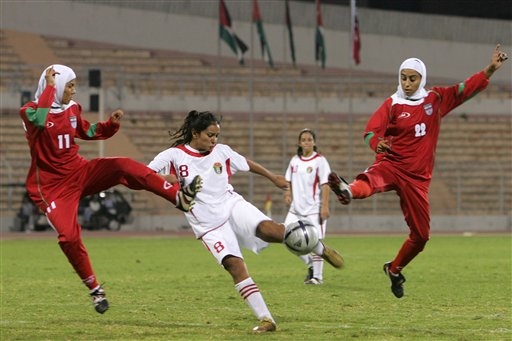
LONDON (AP) — FIFA Vice President Prince Ali bin Al Hussein will urge football's rulemakers on Saturday to overturn a ban on Islamic female players wearing hijabs, insisting they are not religious garments.
Five years after headscarves were deemed unsafe to be worn in matches, the Jordanian prince wants the International Football Association Board to sanction them with Velcro openings so players can uphold their cultural traditions.
Since banning the hijab, FIFA last year extended the safety rule to include neck warmers, which were also judged a possible choking threat.
But before traveling to England for the IFAB meeting, Prince Ali's campaign received the backing of the United Nations, which urged FIFA to give everyone the equal right to play football.
"Women's football has come a long way, as we experienced in the last Women's World Cup, and the present situation is saying to women worldwide that you're not allowed to participate for a reason that makes no sense," Prince Ali said on Thursday in a central London hotel. "That's prejudice. It's not fair. It has to be dealt with. Long sleeves and leggings are already allowed."
Iran had to forfeit an Olympic women's qualifier against Jordan last June because the players refused to play without the hijabs.
While the ban has been condemned by Islamic leaders, Prince Ali will insist that the hijab is not a religious item in a presentation before Saturday's vote in Bagshot, west of London.
"This is not an issue of religious symbolism, it is simply a case of cultural modesty, and I'm tackling this now because it is big issue for many, many women all across the world," he said. "I'd be very disappointed for the game if IFAB said 'No.' It's an issue which will not go away.
"I'm optimistic this will happen. If not, there will be lot of soul searching about what the priorities are in this sport. Everyone from the U.N. to the regional federations are supportive so I don't see what the problem is."
At IFAB, a new rule needs six of the eight available votes to be approved. Each British association — from England, Northern Ireland, Scotland and Wales — has one vote and FIFA officials have four.
Changes typically take effect on July 1 ahead of the following season, but can be fast-tracked if the panel agrees.